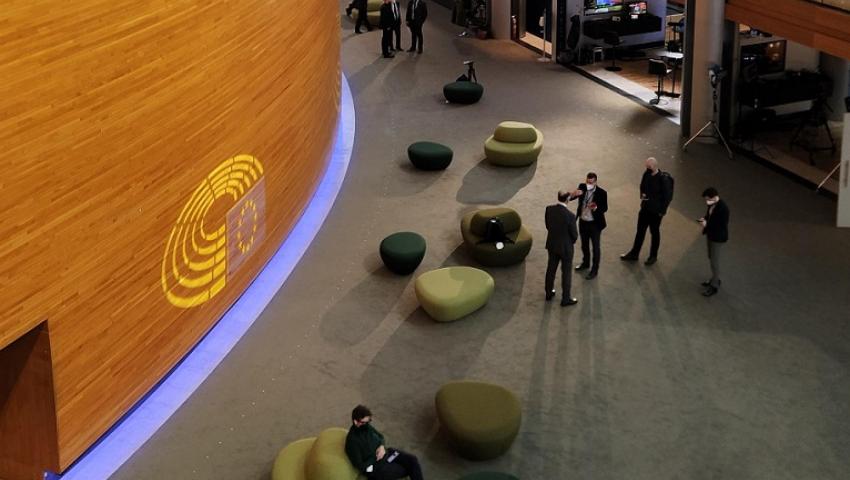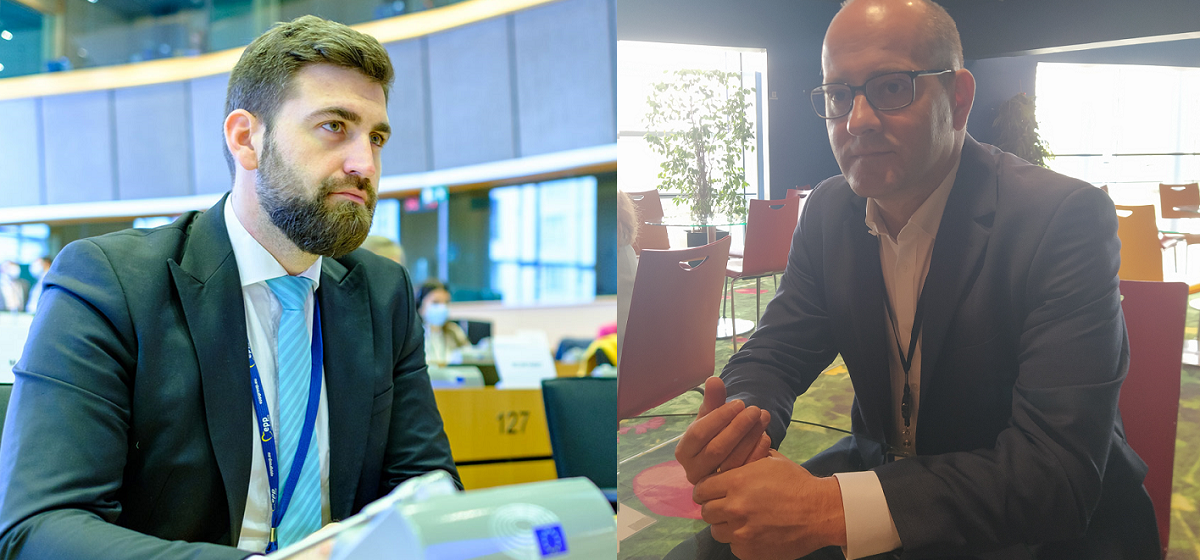The response in Strasbourg for the approval of the Recovery Plan: Bulgaria on the road to a bold but risky technological solution
But the goal of the Recovery and Sustainability Plan is largely to help countries that are severely technologically backward, such as Bulgaria, take a big step forward in their technological development

Photo: 3eNews
3eNews attends Strasbourg to attend first European Parliament live session, halls and corridors were full to discuss key issues of tragedy and aid to Ukraine, sanctions on Russia and ban on oil and Russian imports gas. Against this background, we discussed a number of important topics for Bulgaria.
Raya Lecheva
Bulgaria is embarking on the path of a bold but risky technological solution. This was commented in Strasbourg by Radan Kanev, MEP from the largest political force in the European Parliament, the European People's Party and part of Democratic Bulgaria. This is the technological answer to the question of switching from coal entirely to renewable energy sources. This is one of the key topics that excited us journalists and Bulgarian MEPs in Strasbourg, who attended the first fully live session of the European Parliament, the halls and corridors were full because they discussed the most important topics of tragedy and aid to Ukraine, sanctions for Russia and the ban on oil and Russian gas imports.
We also discussed one of the most pressing issues for Bulgaria in economic terms - the Recovery and Sustainability Plan.

Andrey Novakov, European People's Party in the EP and MP from GERB and Radan Kanev from the European People's Party in the EP, part of "Democratic Bulgaria" comment on complex economic and energy issues important for Bulgaria and Europe today.
According to Kanev, the construction of a battery plant is certainly not a 100% justified technological solution, it will need significant innovation to work. But the goal of the Recovery and Sustainability Plan is largely to help countries that are severely technologically backward, such as Bulgaria, take a big step forward in their technological development. Here the state is technologically backward, private business is not technologically backward. So we have the resources in our scientific community and in our business to fight for this leadership position, Kanev believes.
"I approve of this decision. I saw the criticism of the former Deputy Prime Minister for EU funds Atanas Pekanov, who called it adventurous, but from my point of view the free money in the Recovery Plan should carry some risk, they are free because they allow you to take steps to open a wide door. If you rely entirely on familiar solutions and familiar technologies, from where to where someone will give you free money, "Radana Kanev told reporters at the European Parliament in Strasbourg. "There are financial markets, justify economic risk and take the appropriate loans. This is a decision that can make a leader in an absolutely structural area of the European economy, not just energy. "Will it happen again, I say I see a risk and every normal person sees a risk that it will not happen," added Kanev.
The final debate with the Commission was on the concentration of resources in the country, which contradicts competition law, the MEP commented
However, when asked by 3eNews to what extent the decision to build a battery plant is made for one player in the market and to what extent diversification is achieved, he said: "I think that the last delay in negotiations with the Commission was due to too narrow connection between the concept for production of batteries in the Mari basin and the deployment of batteries in the transmission network of ESO substations in Bulgaria. Such a link is not acceptable from the point of view of European competition law. Related to this were the last details on which Bulgaria had to justify itself. To say who makes the batteries he will install them at ESO substations is associated with the concentration of resources in the country, which is contrary to EU policies. Whether the project will be developed in a way that encourages competition and technological innovation or that serves specific businesses, is a purely management issue and we must all be very vigilant in its implementation.
The recovery plan is the result of a very intensive dialogue between the government and the Commission. Therefore, the plans are not approved by national parliaments. The Commission here has retained so much power in its hands that this cannot happen. The good news is that it has been approved. Now it remains to be seen what the implementation will be. What will be the effects and the impact. Every plan passes for adoption through the governments of the member states, Bulgaria must do the same, it became clear from the words of the MEP.
However, the opinion of his colleague from the European People's Party, MEP Andrey Novakov from GERB, is on a different pole. Although from the same political family in the EU, the two expressed different positions on the subject of the Recovery Plan.
Andrey Novakov: The time until 2024 to use the funds from the Plan is already underway, and new technological solutions are possible over a horizon of about 10 years
According to him, the time until June 2024, in which we have to use almost BGN 13 billion, is significantly reduced. The pressure on the administration to manage these funds is very great. Bulgaria, like many other countries, is currently in a very difficult situation of inability to implement the cohesion funds, these are the operational programs in various areas of the economy. Bulgaria has not submitted or approved operational programs, Novakov said. This could have softened the impact that our economy has suffered from COVID-19, and now from the crisis in Ukraine, he said.
Novakov is worried about the fact that no one has explained to the people in Stara Zagora what will happen, and this is very worrying. What they are asking is whether we will lose our jobs, where such a plant was last built, to see how it works. What will happen to these batteries after they go out of service in 10 years? What will happen to those 7,400 people who work in the mines? This is a question that has been waiting to be answered for 10 years. But there are still many questions at the moment. Will it be possible to compensate for such a large source of energy as Maritza Iztok, they generate half of the electricity?
One of the big problems of the Recovery Plan is that it was not discussed publicly, Novakov told reporters in Strasbourg. There were two or three ministers responsible for writing the Plan - Cornelia Ninova, the Minister of Economy, Asen Vassilev, the Minister of Finance, Daniel Lorer, the Minister of Innovation. According to Novakov, there was a lack of coordination with MEPs, unfortunately the lack of publicity and ambiguity calls into question the decisions. This happened with the Recovery Plan and the planned battery plant. It turns out that there is no such battery plant in the world, 6000 MW do not work anywhere.
The clear and correct implementation of the projects in the Plan is forthcoming, which should be discussed with all stakeholders
It is important for the government to communicate its plans correctly, because it takes years to build a plant. When half of the electricity is produced from coal, you can't start producing gas, wind or sun in two years. If we accept the fastest way is to pass gas to TPP 1, 2, 3, which will take at least 7-8 years. The production of turbines takes 3-4 years if we order them tomorrow, the laying of the pipe takes another 3-4 years. Procedures for Environmental Impact Assessment, permits, implementation, advance payments and if there are no problems with construction. Solutions are possible over a ten-year horizon. If you have to build solar panels, a battery factory to store electricity from them and pray that there is sun and that happens within 10 years, it is even unthinkable. The goal of the Recovery Plan was to provide quick solutions, and that cannot happen, Novakov said.
This gives a certain horizon to the coal. The EU has banned coal imports, but this does not directly affect Bulgaria, which has its own reserves that can be used until 2045. Now the tone towards them in the EU is a bit softened. The Commission, in the person of the biggest supporter of green energy, the Vice President of the European Commission for the Green Deal, Frans Timmermans, is already developing in the position after gas and nuclear energy were adopted as green fuels. The closure of coal in our country also depends on the extent to which we manage to implement the new "adventurous" proposal for energy from renewable sources and a battery plant.
From coal to renewable energy sources and a little-discussed possibility of capturing carbon dioxide
According to Novakov, there is another alternative, which is little talked about in our country, it exists in several places and is related to the capture of carbon dioxide in the chimney of the TPP. It could be funded under the Recovery Plan, he said. "Thus, with one bullet there are much more than two rabbits. First, the miners stay at work, second, they use a national resource that does not depend on any other country, third, you stop paying for harmful emissions, and fourth, you do not pollute the air. They are caught in the chimney and 30 km from Stara Zagora there is a cavity in the bowels of the earth, which can collect carbon dioxide without harming the environment, "said Novakov. It seems to me that this option has not been fully developed. It certainly costs less than paying for 20 years of harmful emissions, the price of which is constantly rising.
The Bulgarian government needs to speak more clearly with the Bulgarian MEPs and to clearly state its position on key issues, so that this position can be heard clearly in the European Parliament as well. Bulgarian MEPs seemed isolated in the process, Novakov said. But now it is imperative to emphasize the importance of a broad public debate at all levels in Bulgaria and in the EU, so that our position and policy can be clear and specific to all institutions, not just the Commission.
